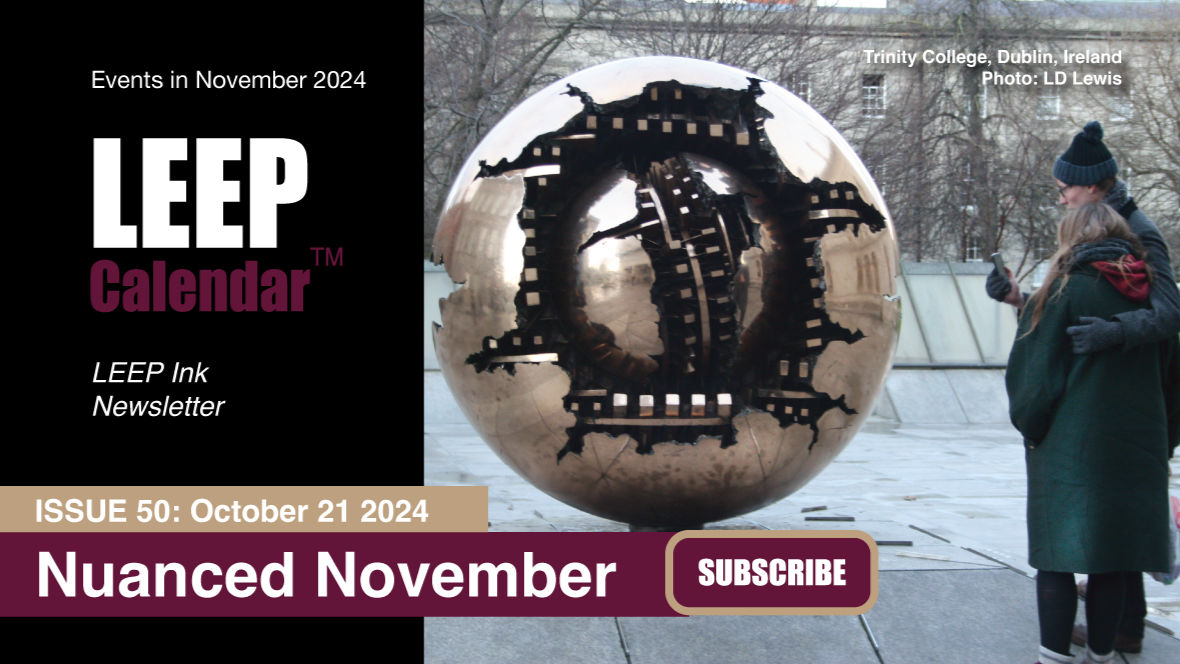 AD
AD
Today is: December 22
Scroll to explore events active on this date.
Additional Events on LEEP
LEEP INK FEATURES

2025 is the Year of...
21 Themes and 'Year of' Events for 2025 PART ONE, THE FIRST 12 Every year, various organizations announce the theme for the year. These themes can focus on causes, such as aesthetics and color tre...

Nuanced November 2024
November is the start of the holiday season in many parts of the world. It is a time for family, football, food, shopping and decorating, particularly in the Christian and Jewish world, leading to Christmas and...

December's Gift
Events in December 2024. Well, we made it to December. December is the holiday season, particularly in Western nations, where Christianity and Judaism are the faiths most common in the nation's past. ...
About Florida's Victims of Communism Day
Finance & Banking , Civil Rights
United States
Ends: Nov 07, 2024
DESCRIPTION:
Victims of Communism Day, November 7, goes into effect in 2022. It comes out of Florida and is part of Governor DeSantis' posturing leading up to the 2024 presidential elections in the United States. The name itself is problematic: "Victims of Communism Day."
There are as many victims of capitalism as communism, arguably more under capitalism, given it has existed for at least one hundred years longer. However, both are ideas for economic governance and how the people in power implement each determines whether they're evil or not. Many leaders are driven by self-enrichment and self-promotion, not by altruism and duty to the people they lead. Therein lies the problem.
Power, for power's sake, leads to poor decisions, and it doesn't matter which economic policy you choose. DeSantis has the right idea in that we need an open discussion on the economic tools available to us as a nation and those used elsewhere. If we're going to criticize one solution within a day, let's look at all and, at the very least, make sure we understand what we're talking about.
CAPITALISM
"Capital," as in money and profit, is the key idea behind capitalism. There is only one goal of capitalism: to make a profit, either through selling more, acquiring more, reducing costs, or buying out the competition.
The general idea behind capitalism is laissez-faire, which states the market dictates cost and the government does not constrain activities. In capitalism, there is a winner and a loser. The most substantial companies in terms of resources and spending survive, though, unlike natural selection, money and size do not guarantee that the best or most innovative organizations continue. Since the objective of capitalism is to make a profit, people and nature are a resource but not the goal. An individual's actual value to capitalism is his/her ability to buy, borrow, and create demand. Yet, despite this system being detrimental to the average person, most will defend the system to death because there is a remote possibility, a fleeting hope that he/she could be that person who beats the odds and becomes wealthy. That hope is why many will vote and act against their interests on taxes, usury, oversight, and other restrictions on profit. Profit and hope are capitalism's seduction.
COMMUNISM
Communism came about as an answer to the excesses of capitalism. "Communal" is the keyword in communism. It is an economic idea that says everyone contributes and benefits equally. In theory, all the money, resources, assets, and benefits go into one pot controlled by the government, which is divided equally amongst all the people. Nobody has more or less. Everyone gets enough to get by, and only the government has the authority to decide.
That theory doesn't work, either. There is no initiative for innovation, risk, or autonomy. All decisions are made by the government, from where and how you live to what career you can pursue. Over time, communism erodes the spark, invigorating people turning them into cogs. You've also got the problem of greed with those running the scheme. Like capitalism, the leaders stop making decisions for the people and instead look for ways to enrich themselves. Even China adopted capitalistic ideas for its industry while maintaining authoritarian rule over its people to survive.
Communism looked fantastic on paper but failed in practice. It promised work, shelter, food, clothing, and equality for life, an enticing idea to the millions thrown into deep poverty during the Industrial Revolution of the late eighteenth and early-to-mid-twentieth centuries. Security and safety are communism's seduction.
SOCIALISM
"Society" is the keyword of socialism. Socialism snuggles between capitalism and communism. Like capitalism, it believes in freedom of choice, commerce, innovation, and markets; it promotes reward for advancement. Like communism, socialism uses money collected through taxes and tariffs to provide goods and services for the population. For example, rather than spending 25% of a federal budget on new bombs, invading countries, or colonization, socialism would take some of that money and improve schools, health care, parks, roads, and other services that benefit the population.
Unlike capitalism, socialism believes organizations require oversight, someone or something to be accountable to prevent abuse, pollution, theft, and skulduggery. It's the old fox policing the chicken coup scenario—not a good idea if you hope to have eggs in the morning. Compassionate caution is socialism's seduction. Even socialism isn't perfect and can be abused, which is why most countries are hybrids. The United States and Europe are predominantly capitalistic and minority socialistic, though Europe leans more toward socialism than the US, particularly in health and elder care. The thing is, capitalism, socialism, and communism are economic ideas, not government structures. You can be a dictator and a capitalist or a communist. You can be a monarch and rule a socialist or capitalist economy and still be tyrannical.
CONCLUSION
Each system has its benefits, appeals, downfalls, and opportunities for abuse. No economic solution is a panacea, and none is a villain. The 50 million who died under Stalin didn't die from communism; they died from tyranny. Thirty-five million were starved to death in 1933-34 because a dictator ordered them to starve as punishment for not bending to his will. People starve to death under capitalism, too, daily. It's called a lack of money to purchase. Lack of supply. Lack of access. Victims of Communism Day misses the point. Like critical race theory (CRT), it's a non-issue formatted into an issue, an electoral dog whistle, banking on fear and a lack of understanding and context. The day is meant to teach bias and close minds rather than stimulate learning, thought, and questions.
VIDEOS
Currently, this event does not have supporting videos.
SUPPORTING DOCUMENTS
Currently, this event does not have supporting documents.
ADDITIONAL IMAGES
Currently, this event does not have supporting images.
Where would you like to go now?
 AD
AD


/footer-logo.svg)
